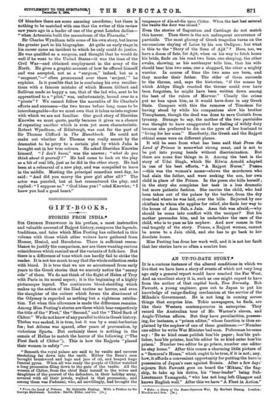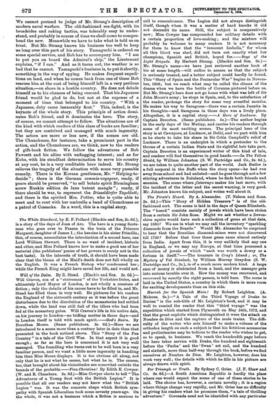IT is a curious instance of the altered conditions in
which we live that we have here a story of events of which not very long ago only a general report would have reached the Far West. And an excellent story it is, such as one might expect to have from the author of that capital book, Torn Burnaby. Bob Fawcett, a young engineer, goes out to Japan to put his knowledge of range-finding mechanism at the service of the Mikado's Government. He is not long in coming across things that surprise him. Tokio newspapers, be finds, are like their Western contemporaries in enterprise. They record the Australian tour of Mr. Warner's eleven, and Anglo-Tibetan affairs. But they have peculiarities, possess- ing, for instance, a "prison editor," whose function is thus ex- plained by the nephew of one of these gentlemen :—"Number one editor he write War Minister bad man. Policeman he come say : Be so kind cease publish hon'ble paper ; hon'ble pub- lisher, hon'ble printer, hon'ble editor be so kind enter hon'ble prison.' Number two editor he go prison, number one editor he stay home." After this comes a charming little picture of a "Samurai's Home," which ought to be true, if it is not; any_ how, it affords a convenient opportunity for putting the hero in possession of Japan's case against Russia. After a few days' sojourn Bob Fawcett goes on board the Mikasa,' the flag- ship, to take up his duties, his "bear-leader" being Sub- Lieutenant Yamaguchi, "who has not long left Glasgow and knows English well." After this we have "A Fleet in Action."
• Kobo a Story of the Russo-Japanese War. By Herbert Strang. London: Blackie and Son. [5s.,1 We cannot pretend to judge of Mr. Strang's description of modern naval warfare. The old-fashioned sea-fight, with its broadsides and raking tactics, was tolerably easy to under- stand, and probably in course of time we shall come to compre- hend the new. Meanwhile we have to take what is told us on trust. But Mr. Strang knows his business too well to keep us long over this part of his story. Yamaguchi is ordered on some special service, and Bob has to accompany him. "I am to put you on board the Admiral's ship," the Lieutenant explains, "if I can." And as it turns out, the weather is so bad that he cannot. Yamaguchi's business is, to put it shortly, something in the way of spying. He makes frequent expedi- tions on land, and when he comes back from one of these Bob rescues him at the cost of being himself left in a very perilous situation,—on shore in a hostile country. He does not delude himself as to his chances of being rescued. That his Japanese friend would be glad to do, but not at the expense of a moment of time that belonged to his country. "With a Japanese, duty came inexorably first." This, indeed, is the keynote of the whole story. This principle of action domi- nates Bob's friend, and it dominates the hero. The story, of course, we cannot attempt to follow. The situations are of the kind with which readers of this class of books are familiar; but they are contrived and managed with much ingenuity. The actors are more or less new, if the scenes are old. The Chunchuses, for instance, take a prominent part in the action, and the Chunchuses are, we think, new to the readers of gift-book fiction. We follow the adventures of Bob Fawcett and his allies with unflagging interest ; and as for Kobo, with his steadfast determination to serve his country at any cost, he is a very creditable hero indeed. Mr. Strang relievee the tragedy of the situation with some very passable comedy. There is the Korean gentleman, Mr. " Helping-to- decide " ; there is the German commis-voyageur, ready, if peace should be preserved, "to sell botato spirit Birmingham screw Ruskin edition de luxe batent mangle " ; ready, if there should be war, to represent the Diesseldorfer Tageblatt; and there is the spirited Mrs. Potter, who is quite able to meet and to rout with her umbrella a band of Chunchuses or a patrol of Cossacks. In a word, this is a capital story.







































































 Previous page
Previous page